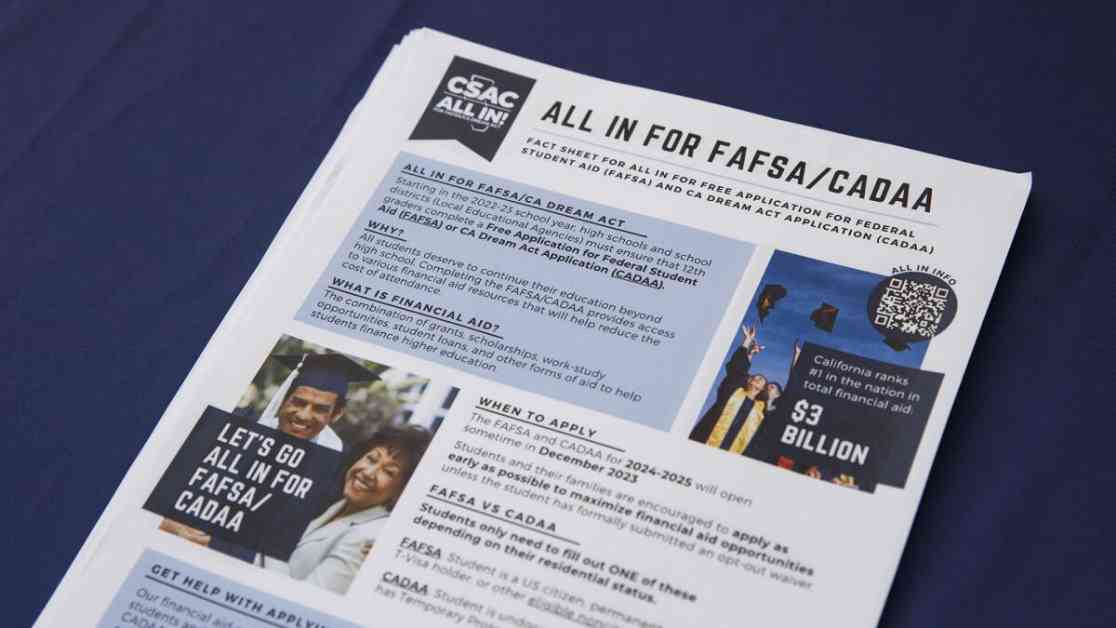Title: FAFSA Dilemma: Undocumented Parents Face Tough Choices as College-Bound Students Navigate Financial Aid
A few days before winter break, Lynda McGee, a college counselor at Downtown Magnets High School in Los Angeles Unified, was faced with a heart-wrenching decision. A student’s father, a warehouse worker who immigrated from Guatemala 28 years ago, visited her office to ensure his daughter’s college dreams were not derailed by his undocumented status. The father, speaking in Spanish through his daughter, a U.S.-born high school senior, expressed his fears about deportation but prioritized his daughter’s education above all else.
The core of this issue lies in the completion of the FAFSA, the Free Application for Federal Student Aid, a crucial step for college-bound students to secure financial aid packages. However, the application requires parents’ Social Security numbers, a hurdle for undocumented parents like the father in question. This dilemma has only intensified with the impending inauguration of President-elect Donald Trump, who has vowed to crackdown on undocumented immigrants.
Uncertain Future for College-Bound Students and Mixed-Status Families
The anxiety surrounding financial aid forms has reached a boiling point for California high school seniors with undocumented parents. The Department of Education, responsible for administering the FAFSA, assures that immigration status data is not shared with other government agencies. However, concerns remain among college counselors and financial aid support groups, especially in light of the changing political landscape.
The National College Attainment Network has issued warnings about the potential risks associated with disclosing immigration status on the FAFSA. While federal law prohibits the misuse of such data, the uncertainty looms large for students and families in mixed-status households, who might be eligible for essential aid but hesitate to apply.
Challenges in the Financial Aid Application Process
The complications surrounding the FAFSA have only exacerbated the fears of students and families. Glitches and delays in the application process have led to a decrease in submissions, impacting first-time applicants and returning students alike. The recent drop in applications has raised concerns about the broader implications of immigration status disclosure on federal financial aid.
In California, where millions reside in mixed-status households, the stakes are particularly high. Students like the high-achieving senior at Downtown Magnets High School face a dilemma: pursue their college dreams or protect their families from potential repercussions. The looming threat of deportation under the incoming administration has added a layer of complexity to an already stressful process.
Navigating Uncertainty in Pursuit of Higher Education
As students grapple with the FAFSA confusion and wait for clarity, the uncertainty lingers. For many, including first-generation college applicants, the path to higher education is fraught with challenges. The added pressure of immigration status disclosure on financial aid forms only compounds their anxiety.
College counselors like Jacqueline Villatoro at Linda Marquez High School are caught in a balancing act, providing students with accurate information while alleviating their fears. The current climate of uncertainty has left many in a state of limbo, unsure of how best to proceed with their college applications.
For students like the one at Downtown Magnets High School, who dreams of becoming a neonatal nurse practitioner, the wait for clarity on financial aid is agonizing. In the face of adversity, these students continue to persevere, holding onto their aspirations despite the challenges that lie ahead.
As the deadline for financial aid applications approaches, families are left with a difficult choice: prioritize their children’s education or safeguard their undocumented status. The future remains uncertain, but these students remain resilient, determined to overcome the obstacles in their path to a brighter tomorrow.
















